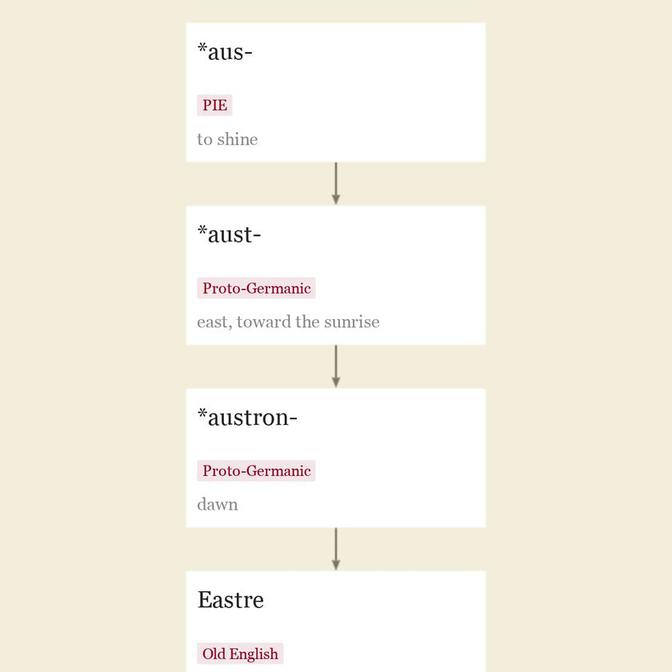paschal (adj.)
“关于逾越节或复活节的”,15世纪早期,来自古法语 paschal(12世纪),直接源自晚期拉丁语 paschalis,来自希腊语 pascha “逾越节,复活节”,源自亚拉姆语(闪族语言)pasha “越过”,对应于希伯来语 pesah,来自 pasah “他越过”(参见 Passover)。Pasche 是中古英语中“复活节”的早期术语(参见 Easter),而荷兰语中更古老的形式 Paas 在纽约得以保留。
paschal 的相关词汇

“Easter day”在古英语中为 Easterdæg,源自于 Eastre(北安布里亚语为 Eostre),来自于原始日耳曼语 *austron-, 意为“黎明”,也可能是一个女神的名字,她的节日在 Eastermonað(与 April相对应的盎格鲁-撒克逊月份)庆祝,来自于 *aust- “向东,朝向日出”(比较 east),源自于 PIE 词根 *aus-(1)“发光”,尤其是黎明。
贝德写道,盎格鲁-撒克逊基督徒采用了她的名字来称呼他们复活节的弥撒。几乎所有邻国语言都使用拉丁语 Pascha 的变体来称呼这个节日(见 paschal)。
Easter egg 最早见于1825年,早期为 pace egg(1610年代)。 Easter bunny 最早见于1904年的儿童课程; Easter rabbit 则为1888年; 复活节的异教徒习俗似乎在约1900年变得流行; 在此之前,它们仅限于德国移民。
If the children have no garden, they make nests in the wood-shed, barn, or house. They gather colored flowers for the rabbit to eat, that it may lay colored eggs. If there be a garden, the eggs are hidden singly in the green grass, box-wood, or elsewhere. On Easter Sunday morning they whistle for the rabbit, and the children imagine that they see him jump the fence. After church, on Easter Sunday morning, they hunt the eggs, and in the afternoon the boys go out in the meadows and crack eggs or play with them like marbles. Or sometimes children are invited to a neighbor's to hunt eggs. [Phebe Earle Gibbons, "Pennsylvania Dutch," Philadelphia, 1882]
如果孩子们没有花园,他们会在木棚、谷仓或房子里做巢。他们采集彩色的花给兔子吃,这样它就会下彩蛋。如果有花园,蛋会单独藏在绿草、黄杨或其他地方。在复活节星期天早上,他们会吹口哨召唤兔子,孩子们想象他们看到兔子跳过篱笆。复活节星期天的教堂之后,他们会寻找彩蛋,下午男孩们会到草地上去砸蛋或像弹珠一样玩。有时孩子们会被邀请到邻居家寻找彩蛋。[菲比·厄尔·吉本斯,“宾夕法尼亚荷兰人”,费城,1882年]
逾越节连日是犹太人每年纪念从埃及逃脱所设立的庆祝,起源可追溯至1530年,由泰恩代尔(Tyndale)通过动词短语 pass over(越过) 创造,以翻译希伯来文 ha-pesah(逾越节)。pesah(请参阅 paschal) 有关上帝“越过”埃及以色列人的房屋为名,而杀死了埃及人的长子(出埃及记 xii)。此外,节日又包括随后的七天,期间以色列人只能吃无酵面包。
“复活节”(Easter),又称“逾越节”(Passover),早在12世纪初就有了 Pasche, Paske; 参见 paschal。现在已经过时。 Pasch-egg “复活节彩蛋”来源于1570年代。